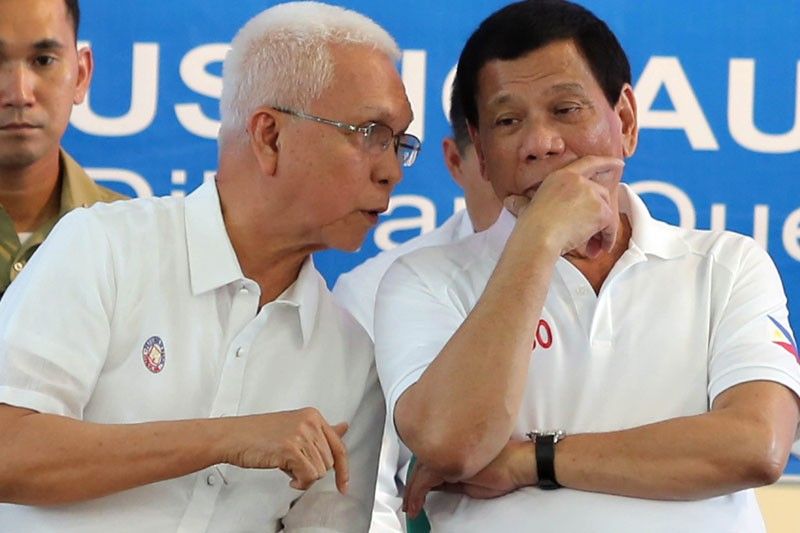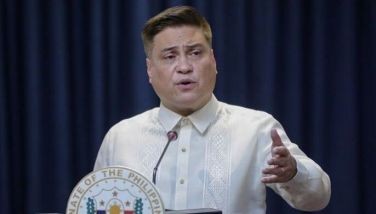Evasco out of NFA council – Palace

MANILA, Philippines — The feud among President Duterte’s men in the rice industry is expected to simmer down as Cabinet Secretary Leoncio Evasco Jr. has been removed as chairman of the National Food Authority (NFA) Council.
In a meeting with members of the NFA Council Monday night, Duterte decided to reconstitute the interagency group, with the Department of Agriculture (DA) set to lead the 18-member team and removing Evasco as chairman.
“The DA will chair the reorganized NFA Council. The CabSec is automatically no longer a member because NFA has been placed back under DA,” Agriculture Secretary Emmanuel Piñol told The STAR yesterday.
During Evasco’s chairmanship, he and his team instituted guidelines that provided a more transparent, competitive, inclusive and accountable system of procurement and distribution of NFA rice.
But Evasco and NFA administrator Jason Aquino have been in disagreement over the planned importation of additional rice to replenish the NFA’s depleted stock.
Evasco said he “respects” the decision of the President to remove him from the NFA Council.
“I can never break the trust given to me by our President Duterte, especially when he appointed me to the position I am in now, a position I did not ask for but wholeheartedly accepted in order to help the President govern our country,” he added.
He also said he was never charged with malfeasance, misfeasance or non-feasance in government service.
Sen. Paolo Benigno Aquino IV lamented the removal of Evasco from the NFA Council, saying Evasco’s removal “is a loss in the fight against corruption in the importation and management of rice.”
“During his time in the NFA Council, Evasco proved his dedication to providing checks and balances to the NFA,” the senator added.
Earlier this month, Duterte said he wanted to abolish the NFA Council. But presidential spokesman Harry Roque later clarified that the council would just be reconstituted.
He said the Philippine Coconut Authority (PCA) and the Fertilizer and Pesticides Authority (FPA) would also be transferred as attached agencies of the DA.
The supervision of the NFA, PCA, FPA, as well as the National Irrigation Administration were all transferred from the leadership of the DA to the Office of the President (OP) by virtue of Executive Order 165 signed in May 2014.
The reorganization of the NFA Council also resulted in the removal and addition of some members.
The NFA Council was originally composed of the Cabinet Secretary as its chairman, the NFA, Bangko Sentral ng Pilipinas, Department of Finance (DOF), Development Bank of the Philippines (DBP), Land Bank of the Philippines, Department of Trade and Industry, National Economic and Development Authority and a farmer representative.
“Former council member DBP has requested to be relieved from the council so that it may focus on its other projects, which was approved. The Department of Social Welfare and Development will take the place of DBP,” Roque said.
Finance Secretary Carlos Dominguez III has also supported the President’s decision to revert the NFA, PCA and FPA back under the supervision of the DA, saying this would help streamline the provision of services to farmers.
“This recent reconsolidation will allow the DA to provide coordinated service to individual farmers and farming communities,” Dominguez said in a text message.
“Farmers will benefit as the DA personnel can provide them advice on seeds, farming methods, plant nutrition and crop protection as well as intercropping where applicable,” he added.
Dominguez, a member of the NFA Council and a former agriculture secretary, said he has “always been a strong advocate of consolidating related activities under unified leadership.”
“In fact, it was through my efforts in the late ‘80s that all crops and agriculture-related activities were consolidated under the DA,” he added.
Stakeholders from the rice industry were also invited in Malacañang for a meeting with the President.
The Grains Retailers’ Confederation of the Philippines Inc. (GRECON) said the reconstitution of the NFA Council would lead to a more stable rice industry.
“The NFA administrator and Secretary Piñol are working and cooperating together. I think they have a more cohesive and clear talk and agreements compared with Cabinet Secretary Evasco before. And this will not only be beneficial for us but for the whole industry and for the Filipinos as well,” GRECON national president Jaime Magbanua told The STAR.
“The President told us that it is important that we have enough stocks and that it is OK to import so we can fulfill our buffer inventory, whichever is easier for as long as transactions are all transparent,” he added.
Duterte also reiterated his approval to proceed with the importation of 250,000 metric tons (MT) of rice via government-to-government scheme to immediately replenish the NFA’s local rice inventory.
Subsequent importation will be done through government-to-private scheme and will be implemented and supervised by the Executive Council Committee composed of the DA, NFA, DOF and the OP.
To avoid another situation of depleted stocks, Duterte directed NFA to increase its food security reserve from the current 15 days to 60 days at any given time.
“He (Duterte) directed Finance Secretary Dominguez to help provide funds for the NFA’s local rice procurement program, emphasizing that he would like the rice agency’s warehouses filled to the roof to assure the Filipino people of sufficient rice supply,” Piñol said.
“He also directed the NFA to increase its buying price of local palay so it could rack up its needed buffer stocks, adding that he did not like a repeat of what happened recently when the country’s rice agency went low on its buffer stocks which led to a spike in the price of commercial rice in the market,” he added.
The NFA buys its buffer stocks both from local production and importation to serve as emergency stocks in times of calamities, and to ensure supplies are being sold at P27 to P32 per kilogram.
The NFA buys rice from farmers at P17 per kilogram, but the agency had a hard time buying locally since last year following better prices offered by private traders that reached a high of P23 per kilogram.
Last year, the country posted its highest rice harvest at 19.28 million MT, which reduced dependence on imported rice to about 800,000 MT.
This year, rice production is expected to grow by about 600,000 MT following good buying prices of palay, favorable climate, and increase in the farmers’ adoption of good quality hybrid rice seeds.
“The country’s dependence on imported rice would be further lessened next year as local rice production is expected to supply up to 96 percent of the national requirement,” Piñol said.
The DA is already helping NFA beef up its palay procurement by identifying areas where buying prices of palay are considerably lower and controlled by traders and middlemen.
“The NFA will focus its palay-buying operations in the areas identified by us and they will provide a space or an area in its buying stations so that the DA could establish drying facilities which the farmers could use for free provided they sell their produce to the NFA,” Piñol explained.
Should farmers want to avail themselves of DA’s flagship loan program, the department will offer incentives and prioritize those who will sell their palay produce to the NFA, the DA chief added.
This year, NFA is allocating P5.1 billion for its palay-buying program nationwide to boost buffer stock and rice distribution requirements as it targets to buy six million bags of palay, double the three million procurement target last year.
NFA starts buying during the summer harvest season but bulk of the target volume is expected to be bought starting October until December as the main harvest season contributes 70 percent to the country’s total annual harvest. With Mary Grace Padin, Christina Mendez, Paolo Romero
- Latest
- Trending




























